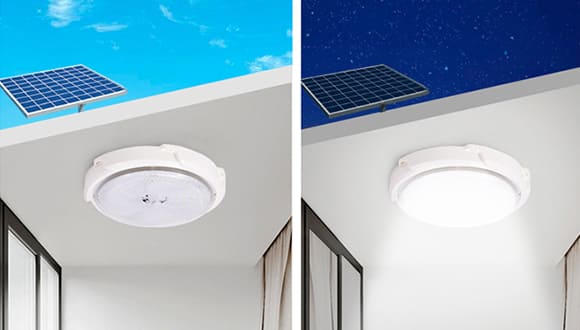When considering the installation of outdoor ceiling lights, homeowners and property managers must weigh two predominant options: solar-powered and electric-powered lights. Each type of lighting solution offers unique advantages and potential drawbacks. The choice between solar and electric lighting for outdoor environments depends on various factors including energy efficiency, installation costs, maintenance requirements, and environmental impact. This comprehensive guide aims to provide detailed insights to help you make the informed decision best suited for your outdoor lighting needs.
Understanding Solar Outdoor Ceiling Lights
Solar outdoor ceiling lights harness the power of the sun to illuminate exterior spaces. These lights are equipped with solar panels that convert sunlight into electrical energy, which is stored in batteries and used to power the lights during nighttime.
Advantages of Solar Ceiling Lights:
- Eco-Friendliness: Solar lights are powered by a renewable energy source, making them an environmentally friendly choice. They contribute to reduced carbon footprints and lower greenhouse gas emissions.
- Ease of Installation: Unlike traditional lighting, solar lights do not require wiring or electrical connections, which simplifies the installation process and reduces initial setup costs.
- Cost-Effectiveness: Once installed, solar lights incur minimal operational costs as they do not consume electrical power from the grid.
Limitations of Solar Ceiling Lights:
- Dependence on Weather: The efficiency of solar lights can be significantly impacted by weather conditions. Overcast skies and shorter daylight hours in winter can reduce the light’s performance.
- Initial Investment: The upfront cost for high-quality solar lighting systems can be higher compared to traditional electric lights, though this is often offset by long-term energy savings.
Understanding Electric Outdoor Ceiling Lights
Electric or wired outdoor ceiling lights are powered through the electrical grid. This traditional form of lighting is known for its reliability and high luminance.
Advantages of Electric Ceiling Lights:
- Consistent Lighting: Electric lights provide consistent levels of brightness, unaffected by weather conditions or time of the day.
- Higher Luminosity: These lights are generally more powerful than their solar counterparts, making them suitable for spaces requiring significant illumination.
- Variety of Designs: Electric lighting offers a wider range of styles and designs due to fewer constraints on size and weight compared to solar options.
Limitations of Electric Ceiling Lights:
- Installation Complexity: Installing electric outdoor lights typically requires professional wiring and adherence to safety standards, potentially increasing initial costs.
- Ongoing Energy Costs: These lights contribute to ongoing electricity bills and have a higher environmental impact due to energy consumption from potentially non-renewable sources.
Comparative Analysis: Installation & Maintenance
Installation: Solar lights are notably easier and quicker to install, as they do not require connection to an electrical power source. Electric lights, while requiring more intricate installation involving wiring, offer a permanent and robust solution.
Maintenance: Solar lights require regular cleaning of solar panels and battery replacements every few years. Electric lights, on the other hand, necessitate periodic checks to ensure wiring integrity and fixture safety.
Choosing the Right Option for Your Needs
To decide between solar and electric outdoor ceiling lights, consider the following:
- Location and Sunlight Exposure: Properties with ample sunlight are prime candidates for solar lighting.
- Budget Constraints: If upfront cost is a concern, solar lights may be more appealing. However, for those prioritizing brightness and reliability, electric lights are a better fit.
- Environmental Impact: For environmentally conscious consumers, solar lights offer a greener alternative.
Conclusion
Choosing between solar and electric outdoor ceiling lights depends on specific needs, preferences, and environmental conditions. By understanding the distinct benefits and limitations of each option, you can select the ideal lighting solution that not only enhances the functionality of your outdoor spaces but also aligns with your energy efficiency goals and aesthetic preferences.


